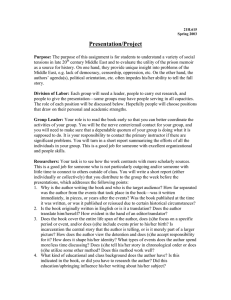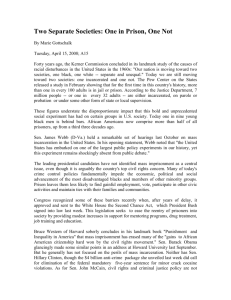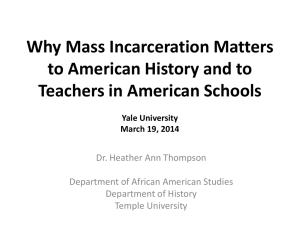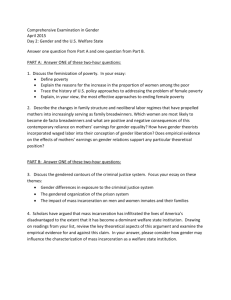Incarceration and Fragile Families
advertisement
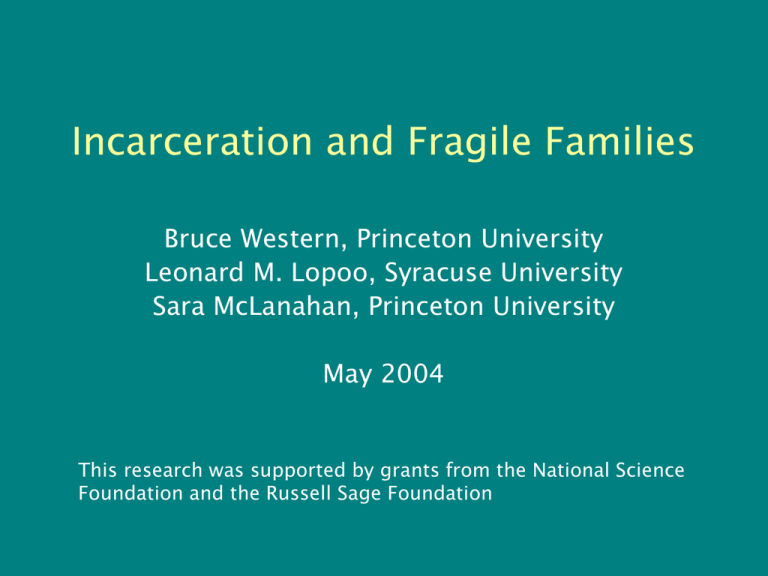
Incarceration and Fragile Families Bruce Western, Princeton University Leonard M. Lopoo, Syracuse University Sara McLanahan, Princeton University May 2004 This research was supported by grants from the National Science Foundation and the Russell Sage Foundation Incarceration and Family Stability • The prison boom has made imprisonment a normal life event for young non-college African American men • Low-education black couples have experienced a large drop in marriage rates and a large increase in non-marital birth rates • Could incarceration be reducing the likelihood of marriage? Is this necessarily a bad thing? Our Empirical Analysis • Incarceration is measured with fathers’ and mothers’ reports in the Fragile Families Survey • We construct a measure of father’s prior incarceration, using mothers’ and fathers’ data • Prior incarceration is related to measures of divorce and cohabitation (longitudinal character of the data attempts to adjust for unobserved heterogeneity) • Low marriage rates among ex-offenders may not be a bad outcome, if men are violent. We can also look at domestic violence Useful Features of FF for Studying the Effects of Incarceration • The survey asks mothers and fathers whether the father has ever been incarcerated • The survey also provides detailed information about the status of the couple’s relationship, and asks mothers if they have ever been assaulted by their partners • Survey data are currently available at two points in time Mothers’ and Fathers’ Reports of Incarceration Father’s Report Mother's Report Noninterview No prison or Jail Prison or Jail Total Non-interview 0.0% 4.8% 6.0% 3.8% No prison/jail 59.7 76.0 31.9 66.5 Prison/jail 40.3 19.2 62.1 29.7 100.0 100.0 100.0 100.0 432 1170 235 1837 Total N Mothers’ and Fathers’ Reports of Incarceration Father’s Report Mother's Report Noninterview No prison or Jail Prison or Jail Total Non-interview 0.0% 4.8% 6.0% 3.8% No prison/jail 59.7 76.0 31.9 66.5 Prison/jail 40.3 19.2 62.1 29.7 100.0 100.0 100.0 100.0 432 1170 235 1837 Total N 50 40 30 Percent Incarcerated 20 10 0 Mom/Dad: YY YN NY Miss. Father is Violent YY YN NY Miss. Father is Critical YY YN NY Miss. Father is Affectionate Some Predictors of Marriage at 1 Year Ever Incarcerated? No Yes Married at baseline 0.34 0.08 Cohabiting at baseline 0.37 0.44 HS dropout 0.27 0.42 College graduate 0.15 0.01 Will compromise 0.57 0.44 Drug or alcohol use 0.13 0.27 N 2797 1070 Incarceration Effects Cohabitation Marriage Baseline Effect Baseline Effect Full Sample .284 .079 Blacks .258 -.055* (.019) -.022 -.029* (.009) -.020* Whites .206 (.024) -.086* (.037) Hispanics .328 -.085* (.038) .043 .145 (.008) -.062 (.035) .120 -.023 (.024) Aggregate Effects of Incarceration Observed marriage rates and predicted marriage rates at an incarceration rate of zero, men aged 30-34, 1999 Observed Adjusted All white men .58 .59 White men, non-college .53 .55 White men, HS dropouts .53 .56 All black men .40 .45 Black men, non-college .33 .40 Black men, HS dropouts .30 .43 Implications of the Incarceration Effects • Incarceration may have large aggregate effects on rates of marriage and cohabitation in poor urban communities with high incarceration rates • Low marriage rates, although associated with social and economic disadvantage, may reduce women’s exposure to violence and crime • We can also study patterns of domestic violence with the Fragile Families data Fathers Committing Domestic Violence (%) 16 Not Incarcerated Drugs Other Violence 12 8 4 0 Bef ore Pregnancy D uring Pregnancy Af ter Pregnancy 6 4 2 0 Percent Reporting Domestic Violence Coresiding Not coresiding During Pregnancy After Pregnancy Logistic Regression on Post-Pregnancy Domestic Violence Incarceration for Violence Incarceration for Drugs Incarceration for Other Offense Cohabiting Marriage Affectionate Length of Relationship 1.31 1.23 (4.17) .98 (3.71) .91 (2.39) (2.14) 1.25 1.19 (5.32) .01 (4.87) .11 (.04) -.78 (.48) -.48 (1.91) - (1.11) -.22 - (1.84) -.09 (2.65) Conclusions • Analysis of Fragile Families data suggests that incarceration reduces the likelihood of marriage and cohabitation • Incarceration effects have a large aggregate impact on marriage rates for non-college black couples • Formerly-incarcerated men are more likely to be involved in domestic violence • BUT, there are drug offenders are less likely to be violent than others, and these effects are offset if men are in strong relationships
